Aaquib Khan is an independent journalist based in Bombay. He was recently in Germany as a Robert Bosch Stiftung Media Ambassador. He tweets @kaqibb.


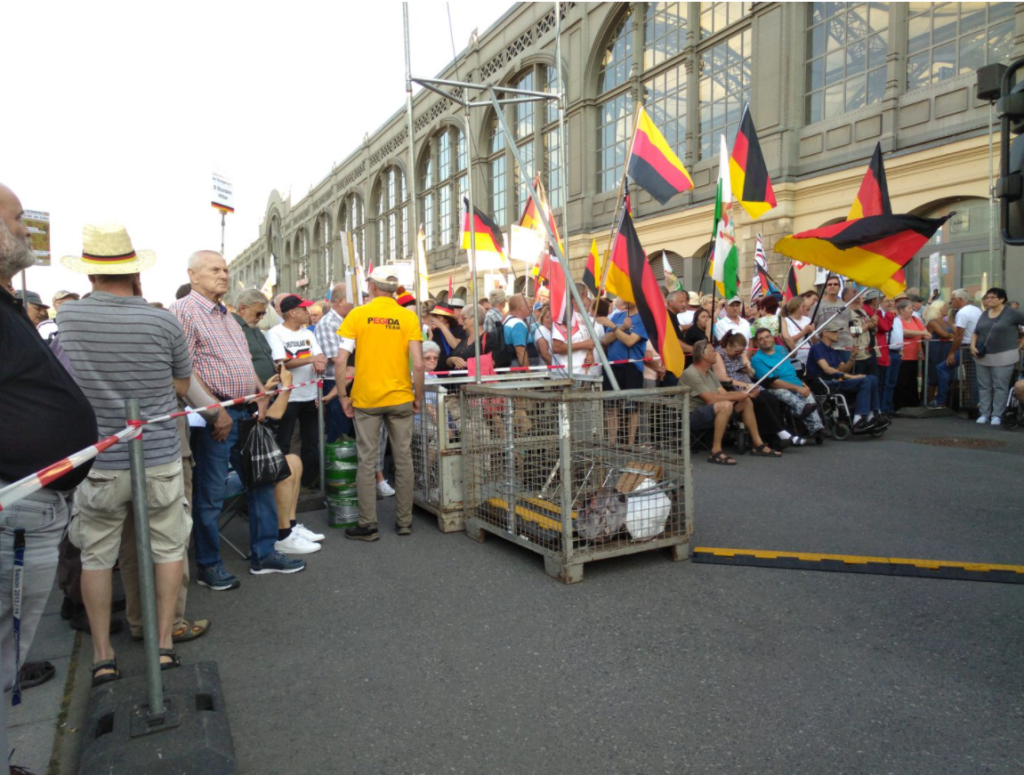
After a brief conversation with his superior over the phone, one of the policemen in the van took my passport. He asked about my local address, phone number and noted the details in his palm-held notebook before handing it over to me. It was a warm summer day in Istha, a small village of some 900 residents in the district of Kassel in the state of Hesse in Germany. In front of me was a vast green field where a horse walked in the distance; the church bell tolled somewhere; the smell of barbeque wafted in the air while my feet made crushing sounds on the raw path that led to the home of the district’s President. An eerie silence surrounded the plush house. As I was not allowed to get close to it, I could only imagine whether the President would be at home. If he had been, he would have welcomed me: he was known for his hospitality to strangers. “He was a humble man,” told me a man in his 90s walking with his dog in a street not far from the President’s home. The humble man he was referring to was Walter Lübcke.
On the night of 2 June 2019, while the Weizenkirmes (Wheat Fair) was going on in Wolfhagen-Istha, Lübcke was sitting on his terrace. Loud music and dance, shaking basses and beer from the brewery: the festival was only a few hundred meters away from his home. He met a local visitor that night, and the meeting ended between 10:30 and 11:00 pm. After that, he stayed outside on his terrace for a while, smoking. Stephen Ernst, who was waiting for that moment, suddenly appeared on the terrace. According to German investigators, he shot Lübcke in the head at a short range. Lübcke was declared dead later that night. Since the night of his murder, a small group of policemen are stationed outside the house.
It was Germany’s first far-right political assassination since the Nazi era.
Walter Lübcke was born in 1953. He spent most of his career in Hesse municipal and state politics. In 2009 was nominated district President by Hesse’s state premier Volker Bouffier. As a top official and head of the state’s regional authorities, Lübcke – a 65-year-old politician of the Christian Democratic Union (CDU) and a strong supporter of Chancellor Angela Merkel’s open-door refugee policy – was made answerable in 2015 for taking refugees in the administrative district of Kassel. This put him in direct confrontation with right-wing extremists – a confrontation that ended with his cold-blooded murder.
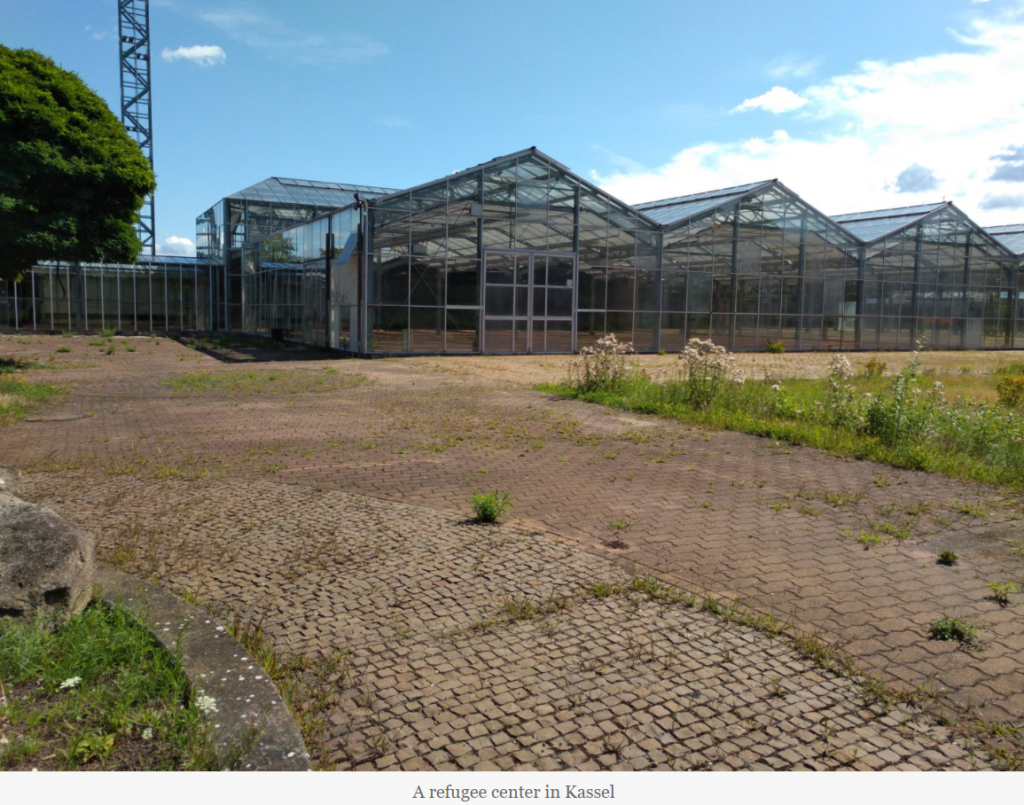
“Human dignity shall be inviolable. These are the first words of our constitution and that was Lübcke’s life’s motto,” Kurt Heldmann told me. Heldmann is a Kassel-based photographer who worked in various capacities with Lübcke for a year during the refugee crisis in 2015-2016 and found him a citizen-centered politician. A politician carrying the ethos of German constitution dearly. “He was a gentleman who was open to talk to everyone. He went to the people and talked to them. We have a word for that kind of people, bürgerfreundlich (citizen friendly). As a politician he was open; he was friendly to people. He was the prototype of this. He was approachable. You could talk to him at any time. If he was having a beer, you could go and say I have a problem, let’s talk about it and he would talk to you. He didn’t say make an appointment, call my office – no, he just talked to them.”
Lübcke’s flexible and friendly nature brought him many enemies too.
On the evening of 14 October 2015, 800 people gathered in a public meeting in the townhall of Lohfelden, a small city close to Kassel. In the meeting, Lübcke spoke about a new shelter for refugees and discussed about building trust between the host and guest communities. A group of angry far-right activists, some of them associated with the Islamophobic group Patriotic Europeans Against the Islamization of the West (PEGIDA), kept disrupting Lübcke’s speech with constant noises and nasty comments like “Shit government.”
“There were around 10-15 people. Some sat in the front row and some stood at the back,” recalled Kurt Heldmann. Lübcke remained calm and did not let himself fall for the provocation. In a video of the event uploaded on YouTube the same evening, he is seen talking about Christian values. The continuous interruption, however, irritated him and at one point he sounded tough and said something to the audience that would eventually create a physical and virtual witch-hunt against him by far-right circles that accused him of not caring about their own citizens. “One has to stand up for our own values here. And those who don’t do so, can leave this country any time if they don’t like it. That’s the freedom of every German,” Lübcke said and the video you can see someone from the back row yelling back at him: “Verschwinde, Go Away!”
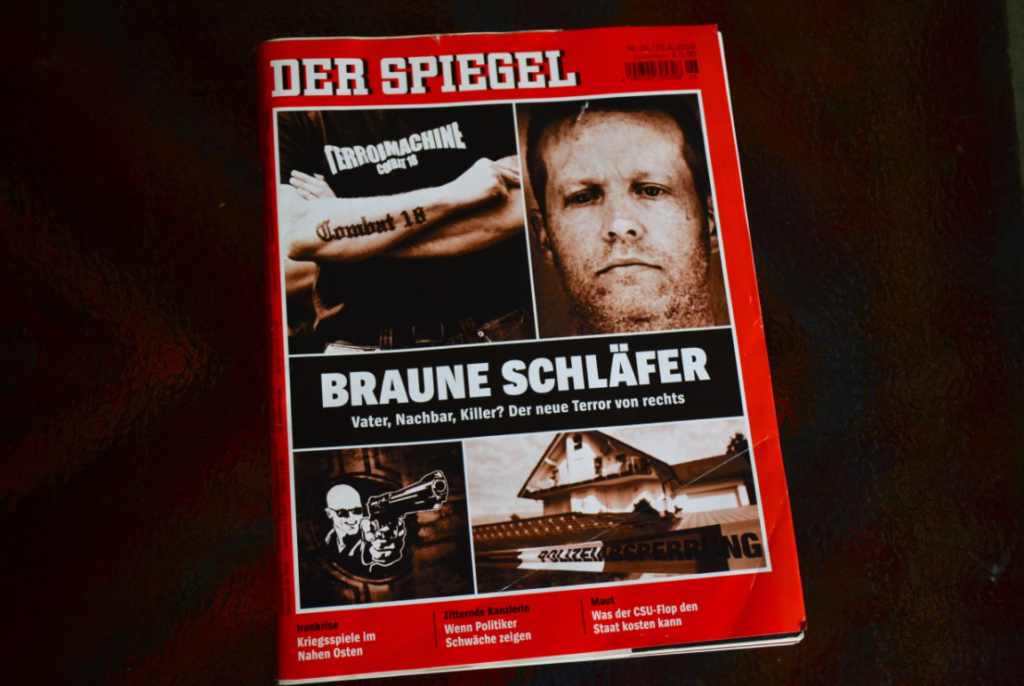
‘This is Stephen Ernst with Markus Hartmann. Hartmann is a weapon dealer,” Heldmann told me while showing me on his BlackBerry phone a photo from the 14 October. Ernst was standing in the back of the hall with a few other far-right hooligans that night.
After his arrest, German news outlets and research organizations focusing on far-right extremism reported about Ernst’s political sympathies and his connections to neo-Nazi groups. In the 1990s Ernst, now 45 years old, was frequently prosecuted for violent attacks, including the stabbing of a migrant in 1992 and the attempted pipe bombing of a refugee shelter in Hesse in 1993. In 2009 he was sent to prison for seven months for attacking a trade union demonstration. Investigators believe Ernst had communication with the far-right NPD party, as well as with the neo-Nazi terrorist network Combat 18, which first made its appearance in the United Kingdom, spread out to other European countries and has chapters in the U.S. and Canada. Its members are known for urging violence, amassing weapons and broadcasting far-right propaganda. On the internet, Ernst incites hatred against foreigners and the government under the pseudonym Game Over. In 2018 on YouTube he threatened: “Either this government will abdicate shortly, or there will be deaths.” According to media reports, in 2016, Ernst sent a contribution of 150 Euros to Alternative for Deutschland (AfD), Germany’s far-right party, from his bank account with a note that read: “God bless you!”
Kirsten Neumann of the Mobiles Beratungsteam (MBT), a Kassel based organization that observes the activities of the far right extremists, promotes democracy and offers counseling to victims of racism and far-right violence, confirmed in an interview Stephen Ernst’s long association with far-right groups. According to Neumann, far-right extremism was always present in Germany: “They were always as dangerous as today. There was always racism and terrorist attacks: the Nazis did not really go away after end of war.”
Ernst was recognized as a criminal suspect based on the DNA evidence found on the scene of Lübcke’s murder. He furnished a thorough confession, but later retracted. It is customary in Germany that extremists are on a watchlist only for ten years and are no longer under surveillance if they are not politically active for a certain period of time even though they had been found guilty several times before. This was also Ernst’s case: he was no longer on a watchlist, which proved a clear misjudgment on the part of the agencies. For the last decade the German government, the police and intelligence services focussed their resources on the threat of Islamic terrorism neglecting, and in some cases ignoring, the threat of violent rightwing extremism in the country.
“In the last 10 years the Government has assumed that the biggest threat to the German democracy comes from Salafist or Islamist terror, which I think was never true, but surely not true now as we see a huge wave of rightwing terrorism, ” said Simone Rafael from the Amadeu Antonio Stiftung, a German foundation that works on far-right activism, racism and anti-Semitism in the country. The Foundation is named after Amadeu Antonio Kiowa, a contract worker from Angola, who was murdered by neo-Nazis in 1990; he was one of the first victims of far-right violence after the German reunification.
In a recent press conference Thomas Haldenwang, the head of the Bundesamt für Verfassungsschutz (Federal Office for the Protection of the Constitution), said that there were 24,100 rightwing extremists in Germany in 2018 and, out of those, around 12,700 were willing to recur to violence. He admitted that it is difficult for security services to be able to monitor them all. This concerns Neumann: “The tip of an iceberg that you see above the sea is only a small portion of the iceberg, the largest part is hidden in the sea. The rightwing terrorist attacks and murders are like the tip of the iceberg: the biggest part is under the sea.” Referring to the support and sympathy that often far-right extremists and neo-Nazis receive from people and sometimes even from the secret services, the police and politicians, she says that those who do not oppose them, indirectly support their ideology. “It’s like those three metaphorical apes – don’t say anything, don’t see anything, and don’t hear anything. The lowest part of the iceberg which is under the sea belongs to us – the society – and we should change it.”.
*
Shortly after the townhall meeting on the 14 October, rightwing extremist circles began a hate campaign against Lübcke. He received death threats and was provided police protection until the situation eventually subsided. The YouTube video of the townhall meeting, however, had more than three hundred thousand views and in the comment section from 2015, far-right sympathizers called Lübcke Volksverräter (Traitor of the people) while others fantasized to ‘shoot’ or ‘hang him.’ Pamela Gellar, famous for her racist and Islamophobic comments also shared a twisted version of this meeting on her website. After Lübcke’s assasination, the latest comments by far-right users celebrated his execution. In February 2019, the same video was posted by Erika Steinbach, a former CDU member of parliament who broke off from her party and joined the AfD, which is now the third largest political party in the German Bundestag. Her post sparked another hate campaign against Lübcke, whom she had known for a long time as they both belonged to the same political party.
When I interviewed Dr. Konstantin von Notz, a German politician and Green party’s domestic security expert, he told me that he was surprised that, despite all the discussions and demands to moderate or delete violent and derogatory comments against Lübcke, YouTube did nothing to stop them. “We have to regulate social media platforms. The way they do it is very inefficient and not very responsible. I haven’t seen any relevant action since Lübcke’s murder.” Criticising the rightwing populist AfD’s politics of hate and their opposition to Merkel’s refugee policies, Dr. von Notz was very clear about their undemocratic agenda: “They have populist slogans and will blow up Europe if they get to power. AfD made no secrets about their interests to get rid of the liberal and free democracy that we have. You can call them enemies of liberal democracy.”
The assassination of Lübcke is considered as a breaking point and many politicians came forward to criticize the rhetoric and weaponized language used by the far-right in Germany. In an opinion piece for the German news magazine Die Welt, the former CDU General Secretary Peter Tauber condemned AfD for its use of rhetoric, which in his view contributed to changing the political climate in Germany. Tauber made AfD accountable for Lübcke’s death, because members of that party used language that led to violence. “With the dissolution of language, AfD has paved the way for the dissemination of violence,” he wrote. German Chancellor Angela Merkel warned against using inappropriate language and destructive tones in discussions: debate should be promoted, but people should be “respectful in their choice of language. CDU party leader and current Minister of Defense Annegret Kramp-Karrenbauer said Lübcke’s assasination shows how the AfD’s use of “hate and incitement” has overturned taboos in language and “lowered inhibitions so much that they result in pure violence.”
*
French philosopher Roland Gérard Barthes in his book Writing Degree Zero (1953) wrote: “Language is never innocent.” Dr. George Lakoff, a linguist and professor at the University of Berkeley, California, states that language can have a fundamental relation to our thinking and behavior. Elisabeth Wehling, a German cognitive scientist, confirms language to be not an abstract thing but has an association to our body or the world. According to her, it’s a real work of our brain. It’s us, physical. And that’s why it is such a strong tool.
*
In the last few years the level of language used by the politicians and members of the public has degraded aggressive and divisive language, metaphors that carry negative connotations, previously taboo words as well as expressions of racial purity typically used by the are gaining space in German political discourse. Words like Umvolkung — ethnic conversion) or Völkisch (a racist idea, used by the Nazis to evoke an image of a racially pure state) or Volksverräter(traitor of the people) are coming back to public use.
Dr. Joachim Scharloth, Professor of German Studies at Tokyo’s Waseda University, told me during an interview that using hate words is part of AfD’s political strategy to incite the revival of nationalist ideologies. AfD is trying to redefine the connotations of the use of a certain kind of hate language and metaphors arguing that the fact that it was used by the Nazis doesn’t necessarily make it wrong. “The usage of these terminologies addresses actually two sides. One is the media. On the other hand, it’s kind of dog whistling to those right-wingers. By using those Nazi terminologies also in an affirmative sense, AfD signals to those people that we are aligned with you.”
Local German politicians are the direct victim of the fury of far-right extremists since over a million asylum seekers and refugees arrived in Germany after Merkel’s open-door migration policy. In 2015, Henriette Reker, a pro-immigration politician, was stabbed while she was campaigning for the mayoral election in Cologne. Andreas Hollstein, the pro-refugee mayor of Altena, was stabbed in the neck in a kebab shop in 2017 in a racist attack. There is a surge of such attacks: hateful language is being used in all corners of Europe and this has a direct connection with the increase of political violence. In 2016 a man associated with far-right shot and killed British politician Jo Cox, an advocate for refugee rights. Six rightwing extremists were arrested by the French investigators in 2018: they were allegedly planning to attack the French President, Emmanuel Macron. Earlier that year, some rightwing extremists were arrested by French police for allegedly planning to poison food in a Muslim supermarket. In January 2019 Paweł Adamowicz, the liberal mayor of Gdańsk, Poland, was stabbed to death because of his defense of migrants, refugees and LGBT rights. In July 2019 during raids on far-right extremist groups, the Italian police seized an air-to-air missile, machine guns and rocket launchers .
According to a recent confidential Strategic Report by Europol, the European Union police agency, obtained by German media outlets, the number of arrests for rightwing terrorism in Europe has sharply increased in the past three years: from 12 arrests in 2016 to 44 in 2018. “In order to build up their physical abilities and combat skills, members of extremist far-right groups are attempting to win over members from the military and security services in order to learn their expertise in the area of surveillance and combat readiness.” said the report.
In Germany such groups, whose members include the police, military and elite forces, are very active. Recently Germany’s domestic intelligence agency revealed that Nordkreuz,”a group of rightwing extremists, compiled a ‘death list’ of some 25,000 names and addresses of German politicians and pro-refugee activists who played an active role during the 2015 refugee crisis. The group also ordered body bags and quicklime to kidnap, kill and dispose of the bodies. The arrival of 1.2 million people fleeing from wartorn Syria, Iraq, Afghanistan created an extraordinary situation in Germany, which was exploited by the far right to spread their racist and Islamophobic agendas. AfD used this opportunity to extend its voter base all over Germany banking on people’s disgruntlement. “Merkel is obsessed with saving. Saving refugees, saving Africa, saving Syria, saving the world, saving the climate, saving Greta,” a political consultant who works with AfD politician Jürgen Braun, Deputy Chairman of the Committee on Human Rights and Humanitarian Aid (CHRHA) in the German parliament, told me mimicking Merkel’s voice. In his 50s, the political consultant wished to stay anonymous.
This kind of ideology is motivating killers all over the world in Norway, El Paso, New Zealand, Halle.
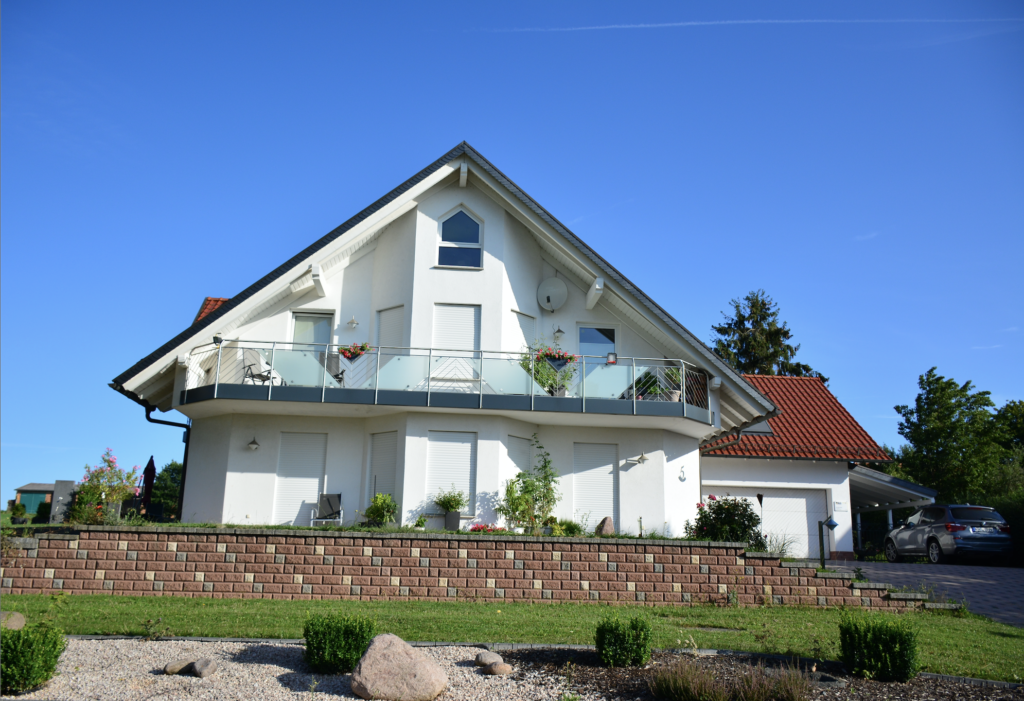
During the 2015 refugee crisis, newspapers, tabloids and TV channels were filled with headlines, pictures and videos depicting masses of people rather than individuals who are victims of conflict. The normalization of such metaphors may lead to lasting prejudices. While in political discussions facts are fading, a certain choice of words could play a manipulative role and incite violence by instilling fear, a sense of threat and hate. Dr. George Lakoff’s research finds that metaphors can kill, as metaphors are reflections of thought or ideology and help provide meaning to life and politics. Dr. Scharloth, however, believes that there is a difficult relationship between words and deeds: the use of particular language, metaphor and polarized framing could incite violence without using physical weapons. “Words don’t kill but we really have to be careful. Of course not everybody who uses hateful language is murderer. But if immigration is framed as an invasion which sound like the occupation of a country by an armed force, then opposing it can be interpreted as legitimate self-defense by some people. If politicians are called ‘traitors of the people’, then attacking them can become a legitimate act of resistance for some people, and I think this is how it works,” Dr. Scharloth said.
According to a recent report, German police listed a total of 609 attacks against asylum-seekers and refugees during the first half of 2019. The report, released by the Interior Ministry, comes after German authorities registered 8,605 rightwing extremist crimes in the first half of 2019, an increase of 900 far-right crimes in comparison to the same period in 2018. German public broadcaster ARD, citing Interior Ministry figures, reported that 1,091 weapons were confiscated during raids on far-right groups in 2018. 676 were seized in 2017, an increase of 61% more weapons. According to an investigative report, far-right extremists have murdered 169 people since 1990.
The use of language inspired by conspiracy theories, hatred and personal biases creates an environment where rational discussion becomes impossible. Lübcke had been urging for empathy towards others, human values and a discussion free from us vs them binaries and in return he was called rat, fat pig, traitor. Prof. Andreas Musolff from the School of Language and Communication, University of East Anglia, explained to me the historical background of some of these commonly used words by the far-right. “Volksverräter (traitor of the people) is a general word and can be used in anger. In a divorce, for example, people might call each other a traitor. It’s an insult. But certainly, traitor fits into a larger conceptual metaphor of being a nation at war. When you are at war, you are either with us or you are against us. And if you are one of us who is against us, then you are a traitor. And traitors, in real war, deserve to be killed for some people.” But why comparing a human to a rat? “Rat is an insulting metaphor because these animals are considered dangerous, dirty and ugly. It was also used at various times by the Nazis. They compared Jewish people with rats. According to them, the Jews live in a similar biological condition: they migrate and transport diseases and they destroy the whole society.”
When we compare humans to rats, flies, termites, vermins or dangerous predators, we contribute to their dehumanization and dehumanization leads to atrocities.
In the world that Nazis wished to create, Jews, Gypsies, people with disabilities and homosexuals were described as Untermenschen, subhuman. They were also described as parasitic and compared to leeches, lices and bacteria that pose a threat to humanity. Comparing humans to bacteria and viruses terrorizes people. “If we have a virus in our body and a doctor tries to annihilate it, we do not normally feel for the poor parasite, but say go ahead, kill them all. And when this whole narrative is transported to the field of politics or in society, it makes easier for many people to think: ok, well, it’s fine to do something radical against immigrants and minorities. If anyone from the outside is a kind of virus or a parasite or an aggressive animal that attacks the body, then it makes sense for some people to think about measures to repel those parasites. If necessary then – exterminate them,” Dr. Musolff told me.
Historians estimate that 11 million people, including 6 million Jews, were persecuted during the Holocaust.
AfD also uses provocative language to manipulate history and reevaluate the gravity of Nazi crimes. In 2018, AfD co-vice chair Alexander Gauland told a party youth gathering that Hitler and the Nazis were just a “speck of bird poop” in more than one thousand of German history. In this way, he minimized the horror of the twelve years of Adolf Hitler’s rule when millions of people were persecuted or perished under Nazi rule. Even though Holocaust denial is illegal in Germany, another AfD leader, Björn Höcke, who is now officially declared ‘fascist’ by a local court, has labeled Berlin’s Holocaust Memorial a monument of shame. German media is often called Lügenpresse (lying press) by far-right groups: the same word was used by Nazi propaganda minister Joseph Goebbels to degrade newspapers critical to Hitler. In an attempt of rasing awareness, in 2014 Lügenpresse was declared the Unwort des Jahres (Non-Word of the Year) by a panel of German linguists.
Language can dress criminals as saviors and honorable people as tyrants. Clearly Lübcke was killed for being a traitor.
Kassel is a city located on the Fulda River in the Northern state of Hesse. It was known for producing German aircrafts and tanks in World War II. On 22 October 1943, the old city centre was completely destroyed by Allied bombings killing 10,000 people. The American army seized the city in 1945. In 1950 the city was rebuilt. Today Kassel is known for its charm, typical of the architecture of the 1950s. This is what fascinated Khalid, a taxi driver who lives in the city. He arrived in Germany some 25 years ago from Afghanistan and, after wandering between different cities, chose to settle in Kassel. It’s his second home. In 2015, when Lübcke welcomed refugees and migrants to the city, Khalid volunteered to help. What impressed Khalid about Lübcke was his humanity, kindness and dedication towards strangers. “He was the Hercules of this city,” Khalid said comparing Lübcke to the Roman god, whose statue is one of the main landmarks of the city of Kassel – a city that lost its hero too early.
Aaquib Khan is an independent journalist based in Bombay. He was recently in Germany as a Robert Bosch Stiftung Media Ambassador. He tweets @kaqibb.


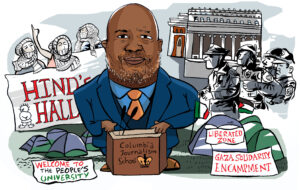
The Polis Project is a 501(c)(3) nonprofit organization. Your tax-deductible contribution goes directly toward supporting our contributors, our staff of talented editors, researchers, writers, producers and artists, and our fellows.
All donations are tax deductible. Our EIN: 82-4072305
[mc4wp_form id=”1367″]
Designed by Collectively Hyd.
© 2021. THE POLIS PROJECT . All rights reserved.
